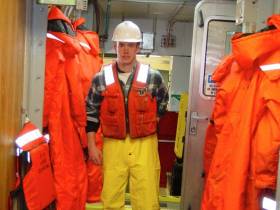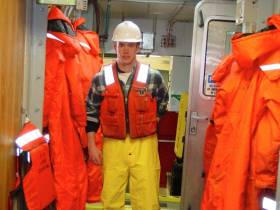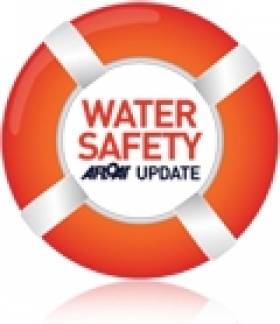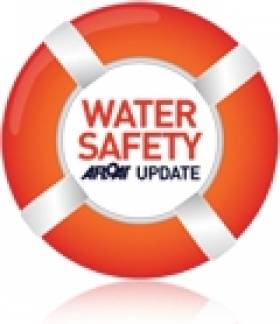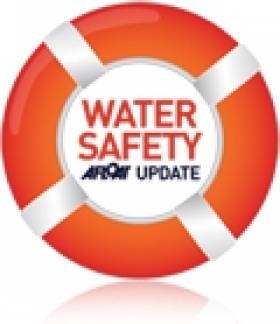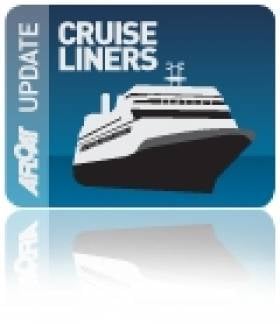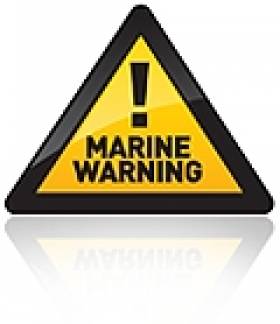Displaying items by tag: lifejackets
#WaterSafety - The latest Marine Notice from the Department of Transport, Tourism and Sport (DTTAS) advises everyone on or near the water of the correct use of lifejackets or personal flotation devices (PFDs).
Lifejackets should always be warn over all clothing, so that there is sufficient space for the device to inflate, the wearer’s breathing is not restricted, and there is easy access to activate a manual personal locator beacon.
Marine Notice No 34 of 2017 comes after the recent MCIB report into the death of lobsterman Patsy Kelly in Galway Bay last September, as previously reported on Afloat.ie.
Kelly, who went overboard from his vessel while retrieving a string of lobster pots, was found to be wearing a PFD but underneath an oilskin smock, significantly limiting his ability to signal for help.
The report also found that Kelly’s lifejacket was five months overdue for service of its active components, such as its gas canister and battery-operated light.
#WaterSafety - The latest Marine Notice from the Department of Transport, Tourism and Sport addresses pleasure and recreational craft owners, masters and users with a brief summary of the legal requirements in relation to the wearing and carrying of lifejackets and buoyancy aids, the penalties arising from non-compliance, as well as advice on the selection and maintenance of personal flotation devices, or PFDs.
The reminder follows from a previous notice in August 2012, and subsequent notices on the care and use of lifejackets, as well as the 27 January edition of This Island Nation concerning good habits over the wearing of PFDs.
Full details can be found in Marine Notice No 10 of 2016, a PDF of which is available to read or download HERE.
Irish Fisheries Chief Wants To Create A Taboo About Lifejackets
Tara McCarthy has a magnificent view out of her office windows.
“You could look out there all day,” she says as we chat in the office on Crofton Road in Dun Laoghaire, looking out on Dublin Bay. Even on a damp January afternoon it is a great vista as a ship heads out of Dublin Port into what it seems will be a harsh enough time ahead at sea. However, it is not the view we have met to discuss, but whether a taboo can be created around a troubling issue – safety at sea and those who will not wear lifejackets.
Tara McCarthy is Chief Executive of Bord Iascaigh Mhara, the State fisheries board, which has launched a campaign to persuade fishermen that they must wear lifejackets. There has been an attitude amongst them that it was better not to wear one. If a fisherman fell into the sea from the boat, it was likely that the sea would take him, so it was better not to struggle to live.
That was the attitude, about which a taboo would be in place if Tara McCarthy has her way.
The statistics are frightening. Fishing is thirteen times more dangerous than the construction industry. Over the last ten years 53 fishermen have lost their lives at sea. BIM research showed that quite a number of fishermen knew colleagues who died at sea but many of those fishermen, even though they knew a colleague who had died in a tragedy, would still not wear a lifejacket.
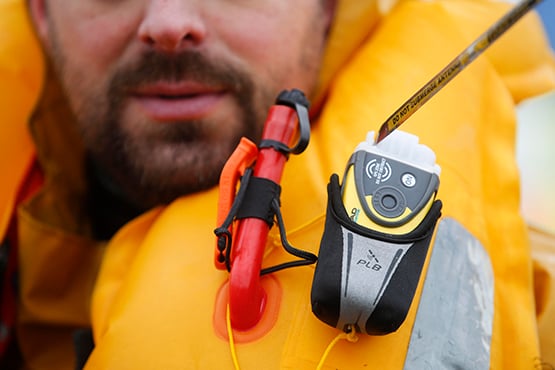
The new BIM lifejacket with built-in position finder
That shocked me and so it did the CEO also, which is why the lifejackets campaign is tough, hard-hitting.
“Those fishermen should realise the impact they could have on their families by a decision not to wear a lifejacket. It is, perhaps, shocking to face them with that realisation but we have launched a campaign that is deliberately hard-hitting campaign. “It is not soft, just saying that it would be nice to wear a lifejacket. We are facing fishermen with a life-impacting decision. We talked to fishermen about this and they told us to make it hard-hitting and that is what we are doing.”
• Listen to the BIM CEO on the programme above
Irish Angler Warns Others To Put Safety First As He Recalls Day Lifejacket Saved His Life
#WaterSafety - Shore angler Colm Plunkett, who credits his lifejacket with saving his life after he was swept into the sea earlier this year, is supporting a water safety campaign launched this week by the RNLI throughout Ireland and the UK.
Plunkett and the RNLI are urging all shore anglers to wear a lifejacket, which could buy them vital time should they end up in the water unexpectedly.
Between 2010 and 2014 there were 29 anglers rescued while fishing from rocks or the shoreline in Ireland and the charity’s lifeboats were launched 43 times to shore angling callouts.
According to research conducted by the RNLI, only 10% of shore anglers wear lifejackets. Yet an expert casualty review panel found that 81% of the fatalities reviewed between 2007 and 2013 could have been prevented had the casualties been wearing lifejackets.
The safety campaign advises: ‘Don’t be an amateur – wear a lifejacket.’
Irish angler Colm Plunkett is one of those who chose to wear his lifejacket – a decision which ultimately saved his life after he was swept from rocks while fishing at Dursey Sound on the Beara Peninsula in West Cork in August this year.
Plunkett and his daughter Orlaith are backing the campaign and have shared their story with the RNLI for the campaign.
"I was fishing when a rogue wave washed me into the sea," he recounts. "I spent the next 55 minutes fighting for my life. Fortunately I was with my 16-year-old daughter, who immediately called the coastguard. Upon entering the water my lifejacket automatically inflated and kept me on the surface of the sea.
"For the first 15 to 20 minutes I was swept by the current out to sea. I spent 30 minutes or so fighting to get air into my lungs while spitting sea water out of my mouth; as the waves broke over my head and the water ran down my face.
"Much to my relief, the current then pushed me back towards the land and to calmer waters. My state of exhaustion and oncoming hypothermia prevented me from reaching the shore but my daughter shouted to me that help was on the way and, for the first time my spirits rose."
Ten minutes later, he recalls, the inshore rescue boat from Derrynane, Co Kerry reached him. "I was brought to shore with a life-threatening low temperature and was taken to hospital by helicopter for further assessment and treatment.
"I am here solely because I wear a lifejacket. If you are not wearing a lifejacket, you are as good as dead."
There are some simple steps anglers can follow to keep themselves safe:
- If fishing from the shoreline, wear a lifejacket.
- Tell someone where you’re going and when you expect to be back.
- Carry a means of calling for help.
The campaign forms part of the RNLI’s work to halve the number of accidental coastal deaths by 2024.
Donegal Firm Innovates In Water Safety With GPS Lifejackets
#Lifejackets - The Sunday Independent writes on Donegal firm Mullion Survival Technology's new innovative lifejackets that come with the latest tech to ensure help comes quickly.
The compact design sits like a collar around the user, with plenty of room for movement, but most important is the built-in GPS beacon that pinpoints the location of the user to rescuers, and a bright light that activates automatically once they hit the water.
What's more, each Mullion lifejacket is registered to a particular user, so that emergency services can know exactly who they're searching for when the alarm is raised.
Mullion's devices have already been credited with saving the life of a fisherman off Co Down, as previously reported on Afloat.ie, and as of this year will be the standard personal flotation device (PFD) for the Irish fishing fleet.
Independent.ie has more on the story HERE.
Marine Notice: Care And Use Of EPIRBs And Lifejackets
#MarineNotice - The latest Marine Notices from the Department of Transport, Tourism and Sport (DTTAS) remind all mariners of the importance of safety at sea - both in seeking help and staying safe till help arrives.
Marine Notice No 38 of 2013 details guidelines for the care and maintenance of Emergency Position Indicating Radio Beacons or EPIRBs, which if installed correctly will automatically operate if a vessel capsizes, notifying the nearest emergency services of your location.
Meanwhile, Marine Notice No 39 of 2013 informs all owners, charterers, masters, skippers and crew of fishing and commercial vessels that correctly selected and worn lifejackets or personal flotation devices (PFDs) save lives.
Marine Notice on Legal Requirements for Personal Flotation Devices
#WATER SAFETY - The latest Marine Notice from the Department of Transport, Tourism and Sport (DTTAS) addresses the legal requirements for all recreational craft owners, masters and users in relation to the wearing and carrying of personal flotation devices (PFDs).
The notice discusses the different types of PFDs - lifejackets and buoyancy aids - and their performance standards, as well as highlighting the importance of their use, proper care and servicing for safe activities on the water.
The law makes clear that there must be suitable PFDs for everyone on board any pleasure craft, and that PFDs must be worn by anyone the deck of any craft or on board any open craft that is under seven metres in lengh - or for people under the age of 16, any craft regardless of length.
Also detailed are recommendations for the storage of PFDs, and guidance for their correct usage.
The use of lifejackets and buoyancy aids is particularly important in light of the recent Marine Casualty Investigation Board (MCIB) recommendations on a number of incidents where their availability could have saved lives.
Full details are included in Marine Notice No 45 of 2012, a PDF of which is available to read or download HERE.
#MCIB - The families of two fishermen found dead at sea off the Skerries last April may never uncover the circumstances that led to their demise. But the official report into the incident indicated that the absence of lifejackets was a significant contributing factor.
Ronan Browne (26) and David Gilsenan (41) were reported missing on the evening of 1 April after failing to return from a trip tending to lobster pots.
Their vessel, Lady Linda, was found the following morning upturned in an oil slick off Clogherhead with no sign of the crew.
It wasn't until a week later that their bodies were discovered caught in the vessel's fishing gear some five miles east of Clogherhead, as previously reported on Afloat.ie.
Post-mortem results found that both men died from drowning, with Gilsenan also showing signs of hypothermia.
With no eyewitnesses to the incident, the report by the Marine Casualty Investigation Board (MCIB) indicated a number of possible causes from eqiupment malfunction or shifting of lobster pots on deck, to the wave height and weather conditions on the day, which were reportedly deteriorating when the boat left port.
It also said that Browne and Gilsenan "were lifelong friends, both men were experienced and qualified marine engineers in the fishing vessel industry. Both men were experienced in boat handling and fishing and had worked together on many occasions."
But the report emphasised the lack of personal flotation devices (PFDs) on board, and noted that emergency equipment was stored under the deck and not easily accessible.
The MCIB's recommendations include a review of the code of practice for fishing vessels under 15m to establish "revised stability critera" and ensuring that all boats are fitted with automatic radio beacons that deploy upon capsize.
In a separate incident, lack of proper maintenance led to an unlicenced boat taking on water off Co Kerry last August.
The Claire Buoyant was carrying one crew, five passengers and 21 sheep from Beginish Island to Ventry when the vessel began to lose stability.
Skipper Eoin Firtear - who the MCIB described as having "limited sea-going experience" - and his five passengers were rescued by passenger ferry. All sheep were jettisoned overboard, with 18 eventually recovered.
The report reminded that the carriage of livestock should only be undertaken in appropriately certified vessels.
- MCIB
- Marine Casualty Investigation Board
- report
- Lady Linda
- Clogherhead
- Ronan Browne
- David Gilsenan
- lobster pots
- Fishing
- drowning
- hypothermia
- missing
- malfunction
- wave height
- Weather
- lifejackets
- Personal Flotation Devices
- PFDs
- Code of Practice
- stability
- Radio
- beacon
- maintenance
- unlicenced
- Co Kerry
- Claire Buoyant
- Sheep
- Passengers
- Beginish Island
- Ventry
- Eoin Firtear
- Skipper
- Rescue
- Livestock
Cruise Lines Mandate Pre-Departure Safety Briefing for Passengers
#CRUISE LINERS - Cruise ship passengers will be given a safety briefing before leaving port under new industry rules drawn up in the wake of the Costa Concordia incident, The Guardian reports.
Three organisations representing international cruise lines have agreed that the 'muster drill' - which is currently conducted within 24 hours of setting sail as per maritime law - must now be held before departure from any port.
The move comes after reports that hundreds of passengers who had boarded the stricken vessel hours before it ran aground off the western Italian coast had not yet had any kind of safety instruction.
Muster drills, whereby passengers are shown how to put on lifejackets and directed to exits, are already common practice in the industry.
As previously reported on Afloat.ie, an Irish couple were among thousands rescued from the Costa Concordia after the incident on Friday 13 January. At least 32 people are believed to have died in the disaster, with 15 recorded passengers still missing.
The Guardian has more on the story HERE.
Campaign to Get Fishermen to Wear Lifejackets
Despite seven fishermen losing their lives at sea this year to date, a laissez-faire attitude to safety still exists in the industry, particularly in relation to the wearing of lifejackets. In an effort to get fishermen to take notice of the real danger of going to sea without wearing a lifejacket, Noel O'Sullivan, a fisherman from Castletownbere, Co. Cork will act as Ambassador for the campaign. Noel survived an accident at sea, along with his six crew, when his vessel 'Discovery' capsized off the Isles of Scilly on the 29th January, 2007.
Noel describes the day of the accident...'I will never forget that day. As we were hauling in the catch, I knew there was something wrong. She was listing dangerously and I instructed the crew to launch the life rafts and jump overboard. As we jumped, she listed violently and capsized onto one of the life-rafts - puncturing it.....I treaded the freezing water for more than two hours until we were rescued..... I was terrified going back fishing but I went back as it's my livelihood, it's what I know...the difference is, I am more aware of the dangers now and I insist all my crew wear lifejackets. I would appeal to all fishermen to do the same' (Hear Noel's full story on BIM's website, www.bim.ie.
The fatality rate for Ireland's fishing sector stands at 88 per 100,000, making it 48 times more hazardous than other occupations*. Wearing a suitable lifejacket is the single most effective measure a fisherman can take to increase the chance of survival if involved in a man-overboard accident at sea.
Jason Whooley, BIM's CEO appeals to the fishing industry: 'I am sincerely asking all fishermen to wear their lifejackets. It could be the difference between life and death, it is that simple. Despite being a legal requirement, it is not something that is taken seriously enough in the fishing sector. We aim, along with our partners, IWS and the RNLI, to change this mentality through a targeted and ongoing safety campaign and I am delighted that Noel, who has personally survived an accident at sea, is helping us to drive this important message home.'
Current RNLI statistics suggest that less than 35% of fishermen regularly wear a lifejacket. Many fishermen feel that wearing a jacket inhibits their mobility and makes working on deck much more difficult. Part of this awareness campaign will be highlighting that there are a growing range of lifejackets that fishermen can use to suit their method of fishing and skippers and crew have a responsibility to themselves, work colleagues and family to consider the available options. In fact, there are new lifejackets on the market that are extremely light and compact and would not interfere with work on deck at all.



























